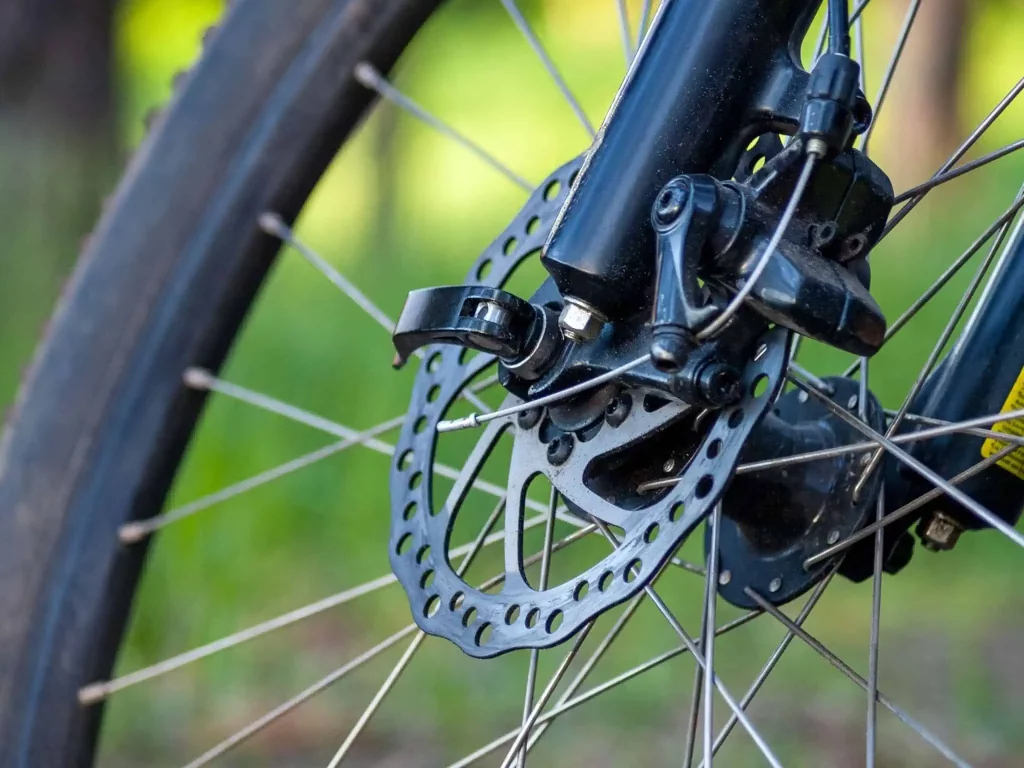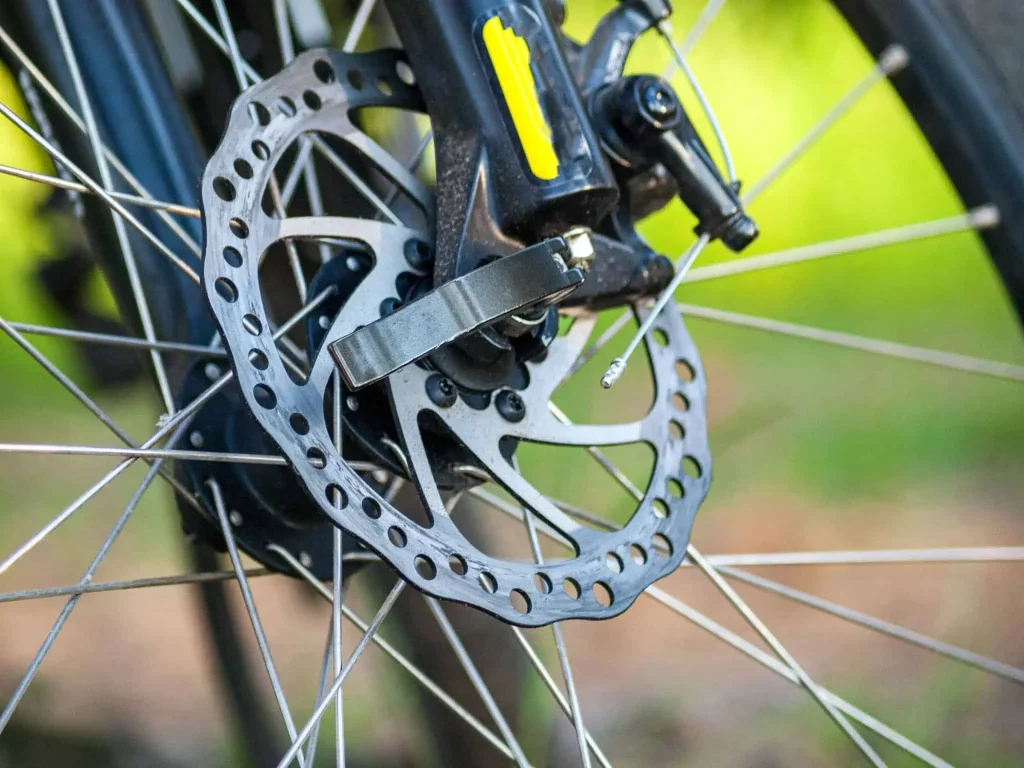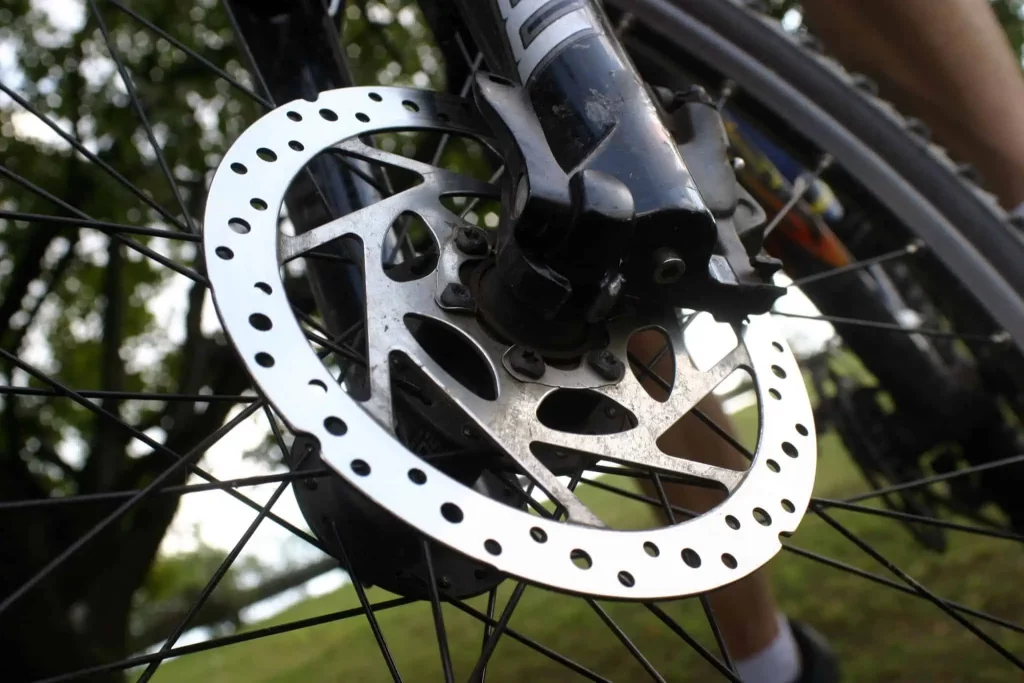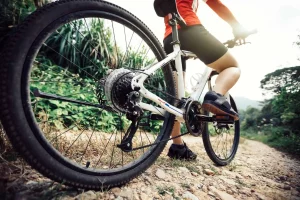Cruising down a peaceful country lane can be a great experience until the tranquility is interrupted by squeaky bike brakes. Not only does this not sound very pleasant, but it can also reduce braking performance.
To fix this issue and restore your bike’s silence, you must first work out what is causing it and how to stop squeaky bike brakes, then attempt to solve the problem yourself. At this stage, bringing your bike to a service center is unnecessary.
When maintaining your squeaky bike brakes, ensure the brakes are clean, lubricated, and correctly tightened.
How to get rid of squeaky bike brakes? If you are already experiencing brake noise on your e-bike, try wearing off the top layer of the brake pad to remove any contamination that could be causing it.
Nothing depends on what kind of bike you have; addressing squeaky bike brakes will increase stopping power so you can enjoy silent rides again!
What makes bike brakes squeaky?
There are many reasons behind squeaky bike brakes, such as contamination of the wheel rim, brake pad, rotor, or misalignment between braking surfaces. New brake pads may also need to be ‘bedded in,’ or the brakes are not correctly set up and vibrating. These are the reasons behind new disc brakes squeaking.
Follow the precise steps when replacing both the rim and the brake pads to reduce the chances of noisy brakes.
Incorrect Brake Alignment
The squeaky bike brakes may not be appropriately aligned with the rim brakes, resulting in a squeaky bike brakes new bike. The brake pad may also become misaligned over time due to regular wear and tear on the bike. Additionally, if the rotor and caliper are misaligned, this can lead to squeaky bike brakes after rain.
Contamination
How to oil squeaky bike brakes? Oiling your brakes helps keep them smooth, but it can sometimes cause contamination on the disc pads, rim brakes, and brake pads. This can lead to a squeaky mountain bike brakes sound when you brake. Worn-down braking surfaces or incorrect alignment between them can also cause squeaking. Contamination may also result from touching the rim with greasy fingers or using aerosol near the braking surfaces.

Squeaky bike brakes are a common and annoying problem that can reduce braking performance. The presence of grease or oil on the brake pad, rotor or wheel rim, misalignment between the braking surfaces, and new brake pads that need to be “bed-in” can all contribute to this issue. To ensure optimal performance, it is essential to make sure these conditions are taken into account.
Noisy brakes can have several causes, one being contamination and the other being poorly set up brakes. How to fix squeaky bike brakes disc? We will look at the most common solutions to eliminate the noise from the rim and disc brakes.
Squeaky bike brakes – What is the distinction between rim brakes & disc brakes?
Rim brakes
Check for contamination first when diagnosing squeaky brakes on the bike. Clean the rims with a degreaser to remove any oil or dirt build-up. Ensure the brake blocks are clean and free from dirt and grit and are wearing evenly. Lastly, check that all bolts securing the caliper to the frame and brake blocks to the caliper are tightly secured – loose bolts can cause noise.
To ensure the proper functioning of your squeaky bike brakes rim, clean and inspect the brake calipers, braking surfaces of the rim, and brake blocks. Tighten any loose bolts securing the caliper to the frame and brake blocks to the calipers. Squeal often results from contamination due to overspray from chain lube or oil from riding in wet conditions. Thoroughly clean your rims with a degreaser to remove residual oil, then use a specialized brake cleaner for optimal performance.
What do you put on squeaky bike brakes?
The noise from your brakes could be due to worn or glazed brake blocks. Remove any small pieces of grit and use sandpaper or a file to smooth away the top layer if it is glazed over. If the brake blocks are worn out, they need replacing; most brake blocks have wear indicators that can tell you if they are worn unevenly. Also, ensure the rims of your brakes are clean as dirt builds up, and a worn rim can decrease braking efficiency. Clean them with soapy water to remove any residual dirt for better braking performance.
If your squeaky bike brakes and judder when you press down on them, it may be because they are not meeting the rim or rotor correctly. To fix this, slightly loosen the mounting bolt(s) while the brake is engaged. Then reposition the pad or disc brake mount to ensure a precise connection point. You can also toe in the pads by loosening them, sliding a piece of card (e.g., a business card) behind their rear section, and tightening the bolt again to make sure that the front section touches the rim first. Special tools are available for this purpose, but you can also use an ordinary piece of cardboard for similar results.
If it has squeaky bike brakes, it could mean that the brake blocks are worn out. Buying new brake blocks is usually the best solution. Different types of brake blocks can be used depending on the rim material and conditions. How to fix squeaky brakes on bike? Changing the type of brake block can often fix noisy brakes.

Common Issues with Rim Brakes
If you’re still hearing squeaky bike brakes after cleaning and tightening your brakes, it could mean they are not set up correctly. To check this, press the brake and make sure the rim and blocks touch each other accurately. Loosen the mounting bolts if needed to adjust their position. A bit of play in the wheel bearings may also create a noisy sound while braking.
Brake squeal can be caused by a few different things, including play in the braking system or hub bearings, as well as flexy bike squeaky brakes calipers. Even a tiny amount of play in wheel bearings can contribute to the squealing sound when the brake block meets the rim.
Disc brakes
The most common cause of squeaky bike disc brakes is contamination, which may occur when lubricants are used on a bicycle with disc brakes, and some of them get onto the rotors or pads. To reduce squeaky bike brakes, it is important to keep the rotors and rims clean by using an oil-free degreaser. Additionally, purchasing a specific disc brake cleaner to keep them contaminant-free can help, but if the disc pads have become contaminated, then they must be removed from the bike in order to sandpaper them down.
Squeaky bike brakes disc can be caused by contamination of the rotor or squeaky bike brakes after replacing pads. To reduce this, avoiding using spray lubes near a bike with disc brakes and regularly cleaning the rotors and wheel rims with an oil-free degreaser is best. Cleaning the brake pads can also help, but if they have been exposed to grease, they may need replacing. Do not use degreasers or chemicals on brake pads. If these steps don’t work, you may need to buy new pads.

How do I stop my bike brakes from squeaking?
To make sure your disc brakes are working properly, it is essential to ensure all the brake components and surfaces are clean. You can buy a dedicated disc brake cleaner or use isopropyl alcohol and a rag. However, if the disc pads have become contaminated, you must remove them from the bike to clean them. You can try scrubbing with sandpaper or baking them in the oven (although this is not recommended).
Bedding in disc brakes is different than rim brakes and should be done after the installation of new pads. To bed them in, ride the bike at a comfortable speed and pull on the brake lever a few times. Noise with disc brakes can also be caused by an uneven caliper or a bent rotor, which can happen when transporting the bike. Rotors can usually be straightened with an adjustable spanner or professional tool.
Loosen the caliper bolts, then squeeze the brake lever while you tighten them. Make sure that the caliper is in the middle of the rotor with equal space on both sides. If needed, make small adjustments until everything looks aligned.
How can I install disc brakes on a bike?
How to fix squeaky bike disc brakes? To set up disc brakes correctly and ensure optimal performance, it is important to bed in the pads properly. To do this, ride at a good speed and firmly apply pressure on the brakes several times. This will allow the discs to become better accustomed to one another.
If none of the above solutions resolve the squeaky bike brakes, it may be because the caliper is not correctly aligned with the rotor. Disc rotors are prone to bending, however, they can be straightened using an adjustable spanner. The positioning of both the rotor and caliper can then be adjusted manually until they match up correctly.

If the steps outlined don’t help to reduce the noise, take your bike to a local bike shop and ask them to fix squeaky bike brakes.
Familiarizing yourself with the parts of a disc brake is important if you want to know why your disc brakes are making loud, obnoxious noises. What causes squeaky bike brakes? The most common causes are listed below, along with instructions on how to fix a squeaky bike brake.
Brake Rub
If your bike makes a noise like squeaky hydraulic bike brakes or squealing at regular intervals while you ride, it is likely caused by an issue with your brake caliper alignment or a bent rotor. To check if this is the problem, lift your wheel off the ground and spin it. Check whether the wheel does not spin freely and comes to a stop, then you have a brake rub issue.
Fix the issue.
Ensure the wheel is correctly placed in the fork or chainstay dropouts. This is especially important if you’re using a QR skewer that doesn’t screw into the frame. An incorrectly installed axle could make both the wheel and rotor look misaligned.
How to stop squeaky brakes on a bike? Loosen the caliper bolts and move the caliper, then press down on the brake lever. This will help to center the caliper over the rotor with the brake pads. Tighten each caliper bolt evenly while still pressing down on the brake lever. Spin the wheel and if it is still rubbing, repeat this process until it is properly aligned.
If your squeaky brakes bike is rubbing, it may mean that your brake rotor is bent. You can check this by spinning the wheel and seeing where the brake pad touches the rotor. How to fix squeaky bike brakes? To fix it, use a Park Tool Rotor Truing Fork to gently bend the rotor back into place. This requires patience and a light touch.
Contamination
If you hear a loud, persistent squealing noise when you apply the brakes, it’s likely due to contamination. Grease and oils can get into the porous brake pads, causing them to squeal and not work well. This can be caused by using chain lube, bike polish, degreaser, or brake fluid. Remember that even touching your rotor or pads with your hands can cause contamination.
Repair it
If oil or grease has been spilled on your brake rotors, clean them off right away using a cloth and isopropyl alcohol. Brake pads have already been contaminated; try taking them off the caliper and lightly sanding the outside layer with fine-grained sandpaper. If chain lube has been used on the pads, it’s best to replace them.
Brake Pads with a Glaze
How to fix squeaky brakes on a new bike? It’s important to break in your new rotor and brake pads on your bike. If you go for a ride that requires a lot of braking, like a steep trail, the rotor will heat up, and the brake pads can become ‘glazed,’ making them less effective at stopping you and producing an annoying squeaky caliper bike brakes sound.
Repair the issue.
To properly break in your brake pads, pedal up a hill in your area. Next lightly squeeze the brakes on the way down. Be careful not to come to a complete stop and avoid feathering (squeezing and releasing) the brakes. Do this ten times until you feel an increase in braking power. This technique allows for an even distribution of brake pad material over the rotor.
Remove the brake pads from the caliper and use sandpaper to roughen their surfaces. Follow this up by properly breaking in your brakes with the appropriate technique.
Water and Heat
If you ride through a puddle or stream on your bike, you may notice your brakes start to squeak. This is a completely normal situation and nothing to worry about; as you use the brakes, the noise will gradually go away. Heat and water can make the brakes noisy, but it’s only a temporary issue.
When riding downhill for extended periods of time, the friction from consistent braking can cause your brakes to overheat and produce a howling sound that may not go away.
Fix the issue!
If your brakes become too hot, the rotor will need to be replaced. If this keeps happening, it means you need a larger brake rotor. Having a bigger brake rotor helps to get rid of the heat from braking and makes the brakes stronger with less noise.
How to Eliminate Loud Squeaking from Bike Brakes
Can you use WD40 on squeaky bike brakes? Hearing squeaking noises while riding can be distracting. Squeaky bike brakes are particularly irritating and can be one of the most annoying sounds.
Can I use WD40 on bike brakes?
Maintaining our bikes properly by lubricating and cleaning them can help keep our bike brakes from squeaky bike brakes. We should also make sure the brakes are correctly tightened. This will help us stay focused on the road.
Can you use wd40 on squeaky bike brakes, Squeaky bike brakes wd40 are usually caused by either dirt accumulation or incorrect assembly.
Place the bike on the bike stand.
To examine your bike properly, you need to position it at the correct angle. If you don’t have a bike stand, you can lean it against a wall or turn it upside down.
Look at the Bike.
Squeaky bike brakes can be very annoying and may even impact your braking performance. Unpleasant noise usually occurs when the brake pads, rotors, or wheel rim contain grease and oil. The noise can also be caused by a misalignment of the contact points between the braking surfaces.
There may be a lot of noises coming from brake blocks that are worn out or glazed over. Aluminum rims usually have a rough surface to provide better braking, but if there’s too much dirt built up on them, it can affect the brakes’ performance.
Make sure the wheel is properly seated in the chainstay and dropouts, then check the caliper.
Before adjusting the brakes, make sure the wheel is securely attached in the frame’s dropouts or chainstay. If you’re using a wheel with a quick-release skewer, ensure it is properly threaded into the frame. Next, loosen the caliper nuts and press down on the brake pedal to check if the caliper is aligned over the rotor.
To align the caliper, you need to constrict the caliper nuts evenly. As you spin the wheel, check if there is rubbing. If so, repeat the steps until it’s aligned. If there is still rubbing, even after trying multiple times, your brake rotor may be bent. Fortunately, this issue can be easily fixed.
Align the Rotor.
To identify where the brake pad is contacting the bent part of the rotor, look through the bike caliper and spin the wheel. You can place some white paper underneath the caliper to make it easier to see.
How to adjust squeaky bike brakes? To adjust a bike’s disc brake, apply the brakes and carefully loosen the mounting bolts. Reposition the pad or mount to create an accurate connection point. Use a Truing Fork to straighten any bent rotors if necessary. Being patient with this process is important as it requires time and precision.
Clean the bike parts.
If your bike’s brakes are squeaking loudly, it could be because they need to be cleaned. Check the brake calipers, blocks, and other components of your rim brakes to make sure they’re clean and in good condition.
To keep your brakes in good condition, start by gently scrubbing off any dirt or debris. If scrubbing does not do the trick, inspect the brake blocks for signs of wear. Unevenly worn blocks are a sure sign that your brakes need to be set up correctly.
Bike brakes may squeak due to contamination. This occurs when the brake pads absorb grime, oil, or other fluids from chain lube, degreaser, bike polish, and brake fluids. Wet weather or riding through puddles can also cause contamination of the disc, which results in a squealing sound and poor performance.
Contaminated pads or rotors often cause a squeal coming from disc brakes on a bicycle. To avoid this, do not use any type of spray lubricant rear disc brakes. Instead, use an oil-free degreaser.
You can use a degreaser, disc brake cleaner, or isopropyl alcohol to keep your bike brakes in good condition and stop them from squeaking.
You can clean your bike’s disc rotors by pouring alcohol onto a small rag and wiping it. If you want to finish the job faster, you can remove the rotor from the wheel or leave it attached while cleaning.
Use sandpaper to sand down the disc pads and brake blocks.
It is important to keep disc pads clean, as contamination can be a problem. Unfortunately, it can be difficult to do this because the part needs to be removed from the bike. To remedy this, some light sanding might help remove dirt or grime.
Why are my bike brakes squeaking?
If your brakes are making squeaking noises, you can fix the problem by smoothing out the top layer of the brake blocks with sandpaper. This will give them a clean look instead of a scratched one.
Advice for Success:
- Avoid handling the brake pads with your hands too much, as it can cause contamination.
- An incorrectly installed axle can lead to misalignment of the rotors and wheels.
There are several reasons behind squeaky bike brakes. When you suddenly press the brakes, it can cause contamination from oils and dirt on the wheel rim. Misalignment between the rotor and brake disc can also cause squeaking.
To fix squeaky bike brakes, you need to identify the cause of the issue and then follow a few steps. This should resolve the problem without any issues.
Squeaky bike brakes -The Bottom Line
If you want to stop your bike from squeaking, follow the steps outlined in the above tutorial. With these steps, you can enjoy a peaceful and focused ride without any bothersome squeaks.
Remember the tools that make maintenance easier, like a degreaser.
If you found this guide helpful, show your appreciation by sharing it with your friends. Moreover, you can even share your own tips on how to stop bike brakes from squeaking.







One Comment
I’ve discovered a newfound sense of freedom and adventure with my ebike.